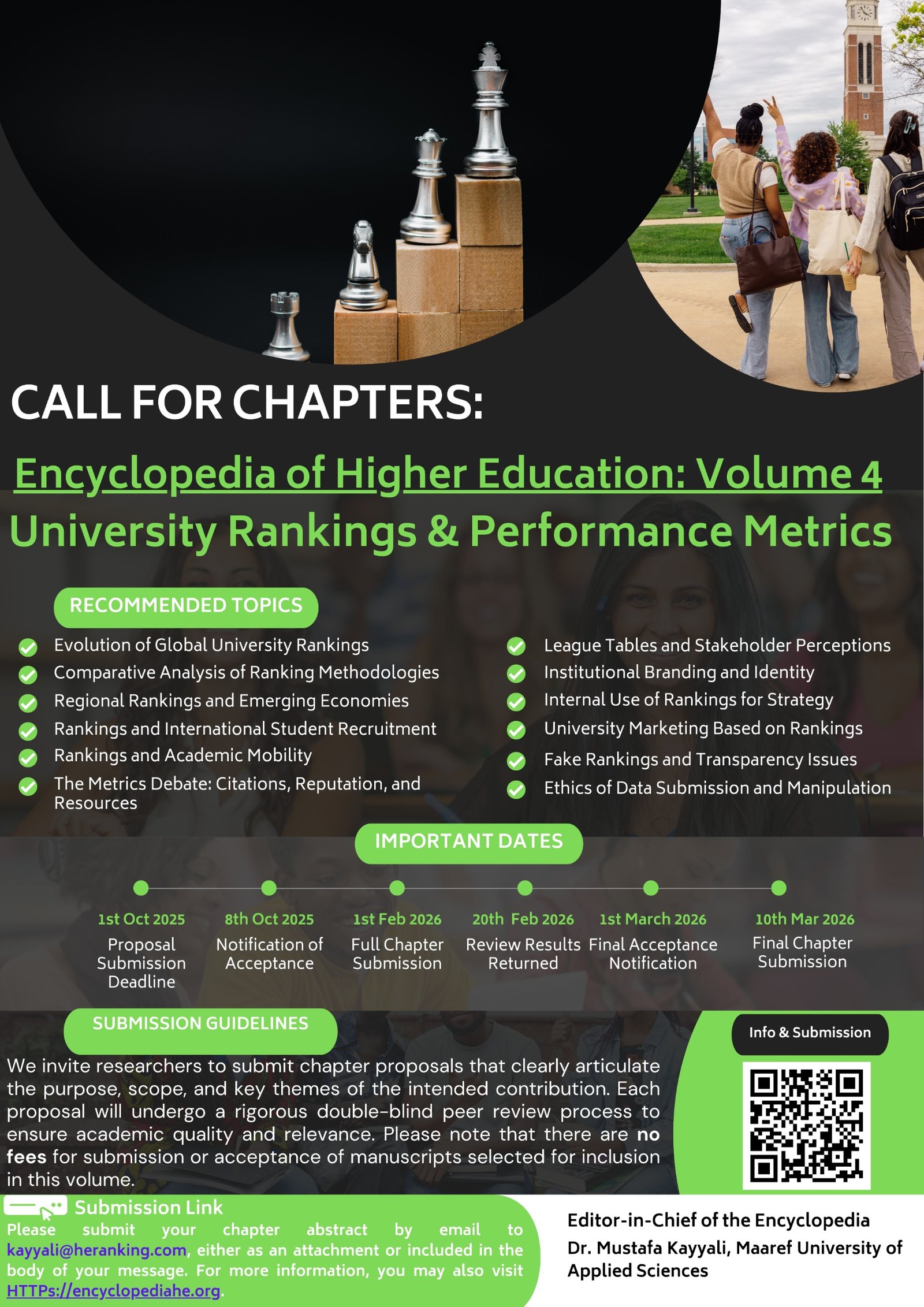Volume 4. University Rankings and Performance Metrics
Overview
This volume offers a critical exploration of the global university ranking ecosystem and the performance metrics that shape institutional behavior and public perception. It maps the historical development of major ranking systems—such as THE, QS, ARWU, and U-Multirank—while dissecting their methodologies, limitations, and underlying assumptions. The volume also unpacks how rankings intersect with key domains such as student mobility, faculty recruitment, internationalization, marketing, and policymaking. Moving beyond traditional citation and reputation-based indicators, the volume highlights emerging frameworks like equity-weighted rankings, impact measures, teaching evaluations, and student voice integration. Topics such as fake rankings, ethical concerns in data submission, and the growing role of AI in dynamic metric systems are also addressed, offering a comprehensive view of a deeply influential yet contested space.
Importance and Impact
As rankings increasingly influence institutional priorities, national education policies, and global academic mobility, this volume provides essential insights into their power, politics, and potential pitfalls. It encourages a more reflective and strategic use of rankings by academic leaders, government agencies, and prospective students alike. By unpacking the metrics debate and spotlighting new models—such as multidimensional, socially responsible, and participatory rankings—it contributes to the search for more just, transparent, and context-sensitive assessment tools. Ultimately, this volume supports efforts to reclaim institutional mission and academic values from narrow performance indicators, while equipping stakeholders with the knowledge to navigate and reshape the future of higher education evaluation systems.
Submission Guidelines
Word Count: 5,000 to 6,000 words
Each chapter should be between 5,000 and 6,000 words, including references. This length allows contributors to develop their argument with sufficient depth while remaining accessible to a global readership.
Language: English
All submissions must be written in clear, academic English. Contributors are encouraged to use inclusive language and ensure clarity for an international audience.
Citation Style: APA (7th edition preferred)
Please follow APA Style, 7th edition, for all in-text citations, reference lists, headings, and formatting. Consistency in referencing ensures academic integrity and ease of cross-referencing.
References: At least 80% published after 2021
To ensure the relevance and timeliness of each chapter, at least 80% of cited sources should be published from 2021 onward. This helps maintain the encyclopedia’s credibility and reflects current research and policy discussions.
File Format: Microsoft Word (.docx)
Submissions must be uploaded in Microsoft Word format (.docx only). This format allows for easier editing, formatting, and review throughout the publication process.
Interested in Contributing?
Researchers and authors who wish to participate in the Encyclopedia of Higher Education project are invited to send their abstract, chapter idea, or full submission directly to: kayyali@heranking.com
Alternatively, you may fill out the following form to express your interest and submit your proposal.

Recommended Topics for Contribution
Authors are welcome to explore any of the following themes—or propose their own original focus aligned with the volume’s scope:
1- Evolution of Global University Rankings
2- Comparative Analysis of Ranking Methodologies
3- The Metrics Debate: Citations, Reputation, and Resources
4- Regional Rankings and Emerging Economies
5- Rankings and International Student Recruitment
6- Rankings and Academic Mobility
7- League Tables and Stakeholder Perceptions
8- Institutional Branding and Identity
9- Internal Use of Rankings for Strategy
10- Media Influence and Ranking Announcements
11- University Marketing Based on Rankings
12- Fake Rankings and Transparency Issues
13- Ethics of Data Submission and Manipulation
14- Alternative Ranking Models (e.g., Multidimensional)
15- Impact Rankings and Social Responsibility Indicators
16- Alumni Outcomes and Social Mobility Rankings
17- Measuring Impact Through Community Engagement Metrics
18- Gender Metrics in University Rankings
19- Teaching Excellence Frameworks (TEF and beyond)
20- Equity-Weighted Ranking Proposals
21- Open Science and Transparency in Metrics
22- Student Voice in Performance Evaluation
23- Internationalization Metrics in Global Rankings
24- Bibliometric Inequities Between Disciplines
25- Artificial Intelligence and Real-Time Rankings
26- Political Economy of Rankings
27- Research vs. Teaching Bias in Rankings
28- Rankings and Faculty Hiring Practices
29- Soft Metrics and Reputation-Based Evaluation
30- Impact of Rankings on Academic Publishing
